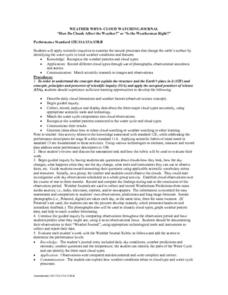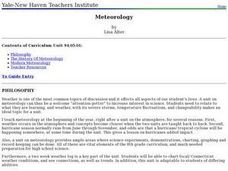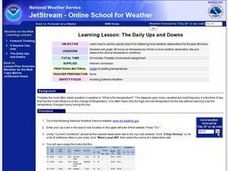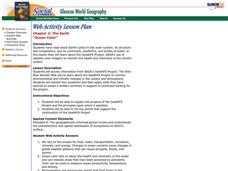Curated OER
How Do We Forecast Weather?
Third graders investigate how scientists collect weather data in order to forecast the weather. They work in small groups in order to research one type of weather technology such as, satellite images, radar, surface observations, or...
Curated OER
Weather Whys- Cloud Watching Journal
Students examine how natural processes change the earth by identifying their local water cycle. Individual students complete a cloud journal over a specific period of time. They observe clouds daily and take photographs of the clouds...
Curated OER
Water 1: Water and Ice
Students examine the changes as water goes from solid to liquid. In this states of matter lesson, students observe and record the changes to water as it changes from solid to liquid and back to solid.
Curated OER
Defining Drought
Students examine the hydrologic impacts of drought. Humans can change the course of the water cycle, to some extent, to meet their needs, but can they do so without imposing risks on the plants and animals?
Curated OER
Meteorology
Students research and produce an oral history that reflects the importance of meterologists in the lives of people in their community.
Curated OER
Weather Journals
Students check and record the weather first thing each morning in their weather journals.
Curated OER
Learning Lesson: Ups and Downs
Students use the internet to find the air temperatures in their area. They create a graph based on the data. They analyze the data and examine tips for avoiding extreme weather.
Curated OER
Watch the Sky: Observing Clouds and Patterns
Young scholars observe clouds outside of the classroom. In this weather instructional activity, students investigate and record the clouds above their classroom everyday for three weeks. The young scholars then analyze their data and...
Curated OER
Salty Solutions
Students measure salt content in water. They determine salt content of four samples using a hydrometer.
Curated OER
Make it Rain!
Students describe how water exists on earth in three states. They trace the path that rain water follows after it falls. Students describe various forms that water takes on the earth's surface and conditions under which they exist....
Curated OER
Sky Watching
Learners trace how weather patterns generally move from west to east in the United States.
Curated OER
Create Your Own Lightning
Students describe weather conditions and climates. They describe patterns of changing weather and how they are measured. Students explain and predict general weather patterns and storms. They use this experiment as a safe and easy way to...
Curated OER
Ocean Color
Pupils examine NASA's SeaWiFS Project Web site to explore how the SeaWiFS Project monitors environmental and climatic changes in the oceans and atmosphere. They answer questions and write a summary in support of continued funding for...
Curated OER
Sunlight and Warm Air
Students examine the different ways heat can be felt. In this radiation and conduction lesson, students recognize that the sun radiates heat. Students conduct three experiments to find how the sun warms the Earth and how that heat is...
Curated OER
Make It Rain!
Students complete an experiment. In this precipitation instructional activity, students complete an activity where they make rain in a jar.
Curated OER
Future tense
Students explore the function of verbs when considering tense. They read a story that is written in past tense and discuss how to change it to future tense. Students transform a news story from past to future tense.
Curated OER
Create Your Own Fog
Students conduct an experiment. In this science lesson, students create their own fog. Students observe the results.
Curated OER
Create Your Own Lightning
Young scholars conduct an experiment. In this lightning instructional activity, students use a blanket and a dark room to simulate lightning.
Curated OER
Biomes: Land of the Inuit
Students study Inuit and their ancestors. In this biomes lesson students study the relationship between the Inuit and their environment and create a class art gallery.
Curated OER
Sea and Ice Salinity
Students conduct an experiment. In this salinity instructional activity, students learn about sea ice, why it is important and how changing amounts can affect the sea. Students conduct an experiment to find out the effects of salinity...
Curated OER
To Fish or Not to Fish?
Learners demonstrate the decision-making process for marine reserves designations. In this role-playing lesson students analyze maps and data relating to a proposed reserve. They formulate the best decisions based on overall issues.
Curated OER
The Water Cycle
Third graders investigate water formations by conducting an experiment. In this water properties lesson, 3rd graders utilize pie tins, sponges and salt shakers to create an evaporation and saturation experiment. Students collaborate in...
Curated OER
What's Going to Happen at Any Given Barometer Reading?
Fourth graders brainstorm a list of words associated with weather. In groups, they sort the words into categories and observe the weather in their area for a month. To end the activity, they compare the barometer measurements for a...
Curated OER
Planning a Tourist Resort
Students work in teams of 2 to complete the presentation portion of the assignment. They may be required to work alone or may work with their partner to complete the "Board Member's Responses."

























